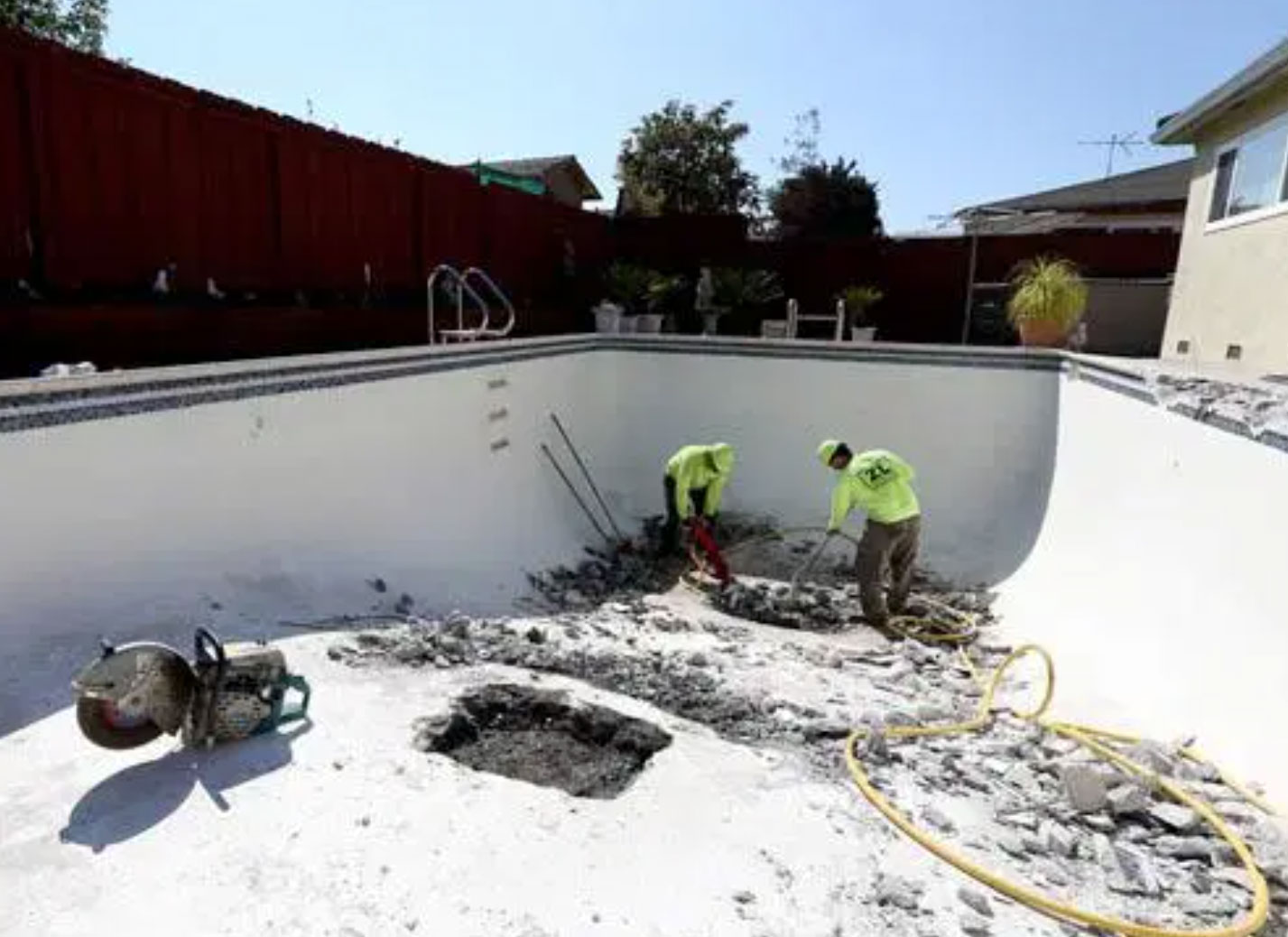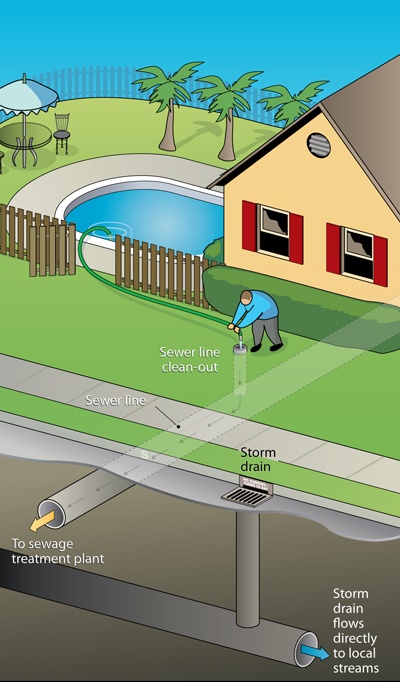POOLS & SPAS
Water from pools and spas often contains chemicals that are necessary for the use of the pool or spa, but that can be harmful to aquatic life and water quality. These additives can include chlorine, algaecides, colored dye, and other chemicals/salts. As a result, it is illegal to discharge pool or spa water that is chlorinated or contains biocides or other chemicals to the storm drain system. The information below explains where to discharge the water when you need to drain your pool or spa and how to properly dispose of pool-related wastes so that you can protect Markham Ravine, Auburn Ravine, and Raccoon Creek.
Please note that before draining your pool, Public Works City staff must be notified a minimum 72 hours in advance to confirm the drainage plan and test the water if needed. Click here to submit your pool or spa drainage request.
Draining Your Pool or Spa – Sanitary Sewer
Content Credit: Sacramento Stormwater Quality Partnership
Using the Sanitary Sewer – BEST OPTION
Draining your pool or spa water to the sanitary sewer is the safest option for our local waterways. Water that is discharged to the sanitary sewer system flows through Lincoln’s wastewater treatment facility where it will be treated so that it removes the chemicals found in pools and spas.
Your pool may already have a permanent direct connection to the sanitary sewer that was placed when the pool was constructed that can be used to drain the water. If your pool has this type of connection it should be used for draining your pool or spa.
Saltwater Pools – SANITARY SEWER DISCHARGE ONLY
If you are draining a saltwater pool, the water may ONLY be discharged to the sanitary sewer system—NEVER to the storm drain. Please follow the same guidelines as listed above.
Draining Your Pool or Spa – Storm Drains
Using Storm Drains – RESTRICTIONS APPLY
If your pool or spa does not have a direct connection to the sanitary sewer AND it is not a saltwater pool, then you may drain the water to the curb/gutter and ultimately the storm drain system ONLY IF ALL OF THE FOLLOWING LISTED REQUIREMENTS ARE TRUE AND ARE APPROVED BY CITY STAFF. If you are uncertain about any of these requirements DO NOT discharge your pool or spa water into the curb/gutter/storm drain. Remember, it is illegal to discharge chlorinated pool water or water that contains biocides or other chemicals to the storm drain system.
Prior to discharging any pool or spa water, make sure that the flow path from your house to the storm drain system is swept such that it does not have any leaves, sediment, or trash that would be carried by the water into the storm drain. Before draining your pool, Public Works City staff must be notified a minimum 72 hours in advance to confirm the drainage plan and test the water if needed. Click here to submit your pool or spa drainage request.
If you discharge (or hire a pool maintenance company and they discharge) pool water to the storm drain system, you may be subject to enforcement action if the discharge does not meet the requirements outlined above.
You may discharge pool or spa water to the storm drain system ONLY if the water is:
- Free of any chemicals: Ensure that you have not added ANY chemicals other than chlorine or muriatic acid to your pool. This includes chlorine, bromine, hydrogen peroxide based products, copper, silver, algaecides, fungicides, soda ash, cyanuric acid and muriatic acid. Over time, chlorine and muriatic acid either dissipate or are converted to non-toxic forms. Reduce the chlorine concentration so it is below 0.01 parts per million (ppm); higher levels harm aquatic life, and the typical pool chlorine level is 2 to 4 ppm. You can test the chlorine using a kit that is available at pool supply stores.
- You can allow the chlorine to naturally dissipate over 3 to 5 or so days or add a chemical dechlorinator (available from most pool supply stores—be sure to follow the manufacturer’s instructions).
- Free of ionizers or mineral purifiers: Be sure that your pool or spa water IS NOT treated with an ionizer or mineral purifiers
- Free of debris, algae, or vegetation: Remove/filter out any debris, algae, or plants that may be in the water.
- Between pH 6.5 and 8.5: Test the pH (using kits available at pool supply stores). If pH is not between 6.5 and 8.5, the pool or spa water may NOT be discharged to the storm drain system.
- Not heated
- Discharged at a flow rate that does not cause damage to the storm drain system, cause erosion downstream, or cause overflow or flooding.
Cleaning Pool Filters
Pool filters CAN NOT be cleaned where the debris or wastewater can flow into the curb/gutter and ultimately the storm drain system. Tips for cleaning your pool filters in a way that is protective of water quality are provided below:
- Wastewater from filter cleaning may be discharged to the sanitary sewer as long as solids are removed. Pool filter backwash connections that are plumbed to the sanitary sewer system must include a settling tank to remove diatomaceous earth.
- If you are hosing off a filter with water, do so over a lawn, planter box, or other vegetated or dirt area that will absorb the wash water.
- Collect materials (such as spent diatomaceous earth filter media) on a filter cloth placed over the discharge surface and then throw the filter cloth and filter media in the trash upon completion of filter cleaning.
Pool Construction
The City of Lincoln’s Municipal Code outlines requirements for permits, application for permits, construction, and abandonment of pools. Please refer to this document prior to any new swimming pool construction.
Image Source: Mercury News

Disposing Unwanted Pool Chemicals
Unwanted pool chemicals must be disposed of as household hazardous waste. If you are a Lincoln resident, you can drop your unwanted pool chemicals for FREE at Westen Placer Waste Management Authority, the city’s household hazardous waste facility. Visit the site for location information, hours of operation, and quantity restrictions.
QUESTIONS: If you still have questions, please contact the City’s Public Works Department at (916) 434-2450.



